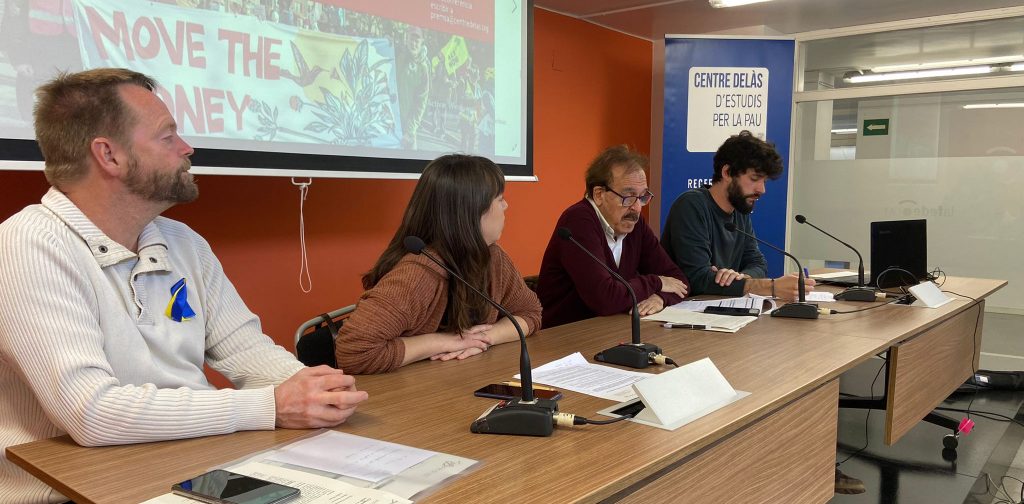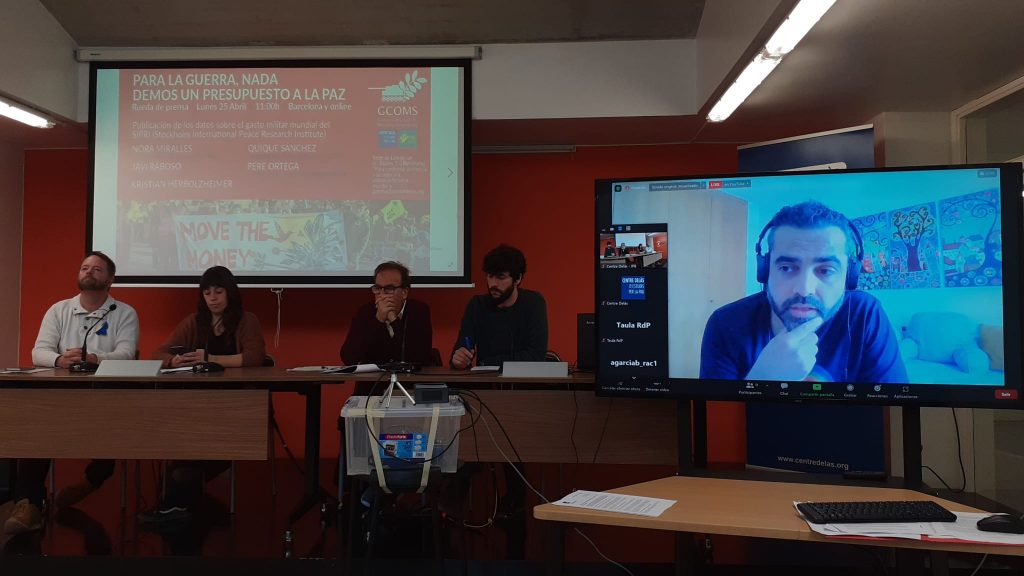Barcelona Press Conference ‘Give Peace A Budget’
Centre Delàs of Peace Studies and the IPB organised a press conference in Barcelona on the occasion of the Global Days of Action on Military Spending (GDAMS) and denounced that “the increase in military spending of the Spanish State announced by President Sánchez would mean an increase of between 13 and 15 billion euros by 2023, in the midst of an international arms build-up”.

The Stockholm International Peace Research Institute (SIPRI) released new data on global military spending for 2021, which is up for the seventh consecutive year to $2.11 trillion: $132 billion more than the previous year. This 0.7% increase in real terms reflects increases in military budgets approved by many governments throughout the first year of the Covid-19 pandemic.
The United States continues to lead by far in global military spending. Although its defence budgets decreased for the first time in four years (-1.4 per cent), they still account for 38 per cent of the global total. Next on the list are China, which accounts for 14 per cent of global military spending and increased its military spending by 4.7 per cent over the previous year, India (+0.9 per cent), the UK (+3 per cent), Russia (+2.9 per cent), France (+1.5 per cent), Germany (-1.4 per cent), Saudi Arabia (-17 per cent), Japan (+7.3 per cent) and South Korea (+4.7 per cent). The combined military spending of the top ten countries accounted for three quarters of global military spending.
If we add up the expenditure of EU member states, the aggregate is 233.617 billion, 11% of the total, the third highest expenditure in the world after the United States and China. This figure will be added to the already growing defence budgets of each member state. Cumulative military spending by NATO member states is again over $1 trillion and represents 55 per cent of the global total. Almost all NATO member countries increased their military budgets by 2021, 9 of which have allocated 2% or more of their GDP to military spending.
These data show how most governments decided to increase their military spending, despite being in the midst of a health emergency caused by Covid-19 which had already been raging for many months. In the framework of GDAMS, two months after the start of the war in Ukraine, the International Peace Bureau (IPB) and the Centre Delàs d’Estudis per la Pau organised a press conference to assess the new data on military spending and call for a reduction in military spending worldwide and in Spain. Instead of dedicating budgets to prepare a war, a budget should be allocated to peace as the only way to stop the war. Nora Miralles (president of the Centre Delàs d’Estudis per la Pau), Javi Raboso (head of the Culture of Peace campaign at Greenpeace), Kristian Herbolzheimer (director of the Institut Català Internacional per la Pau), Pere Ortega (researcher at the Centre Delàs, expert on military spending) and Quique Sánchez (member of the International Peace Bureau and the GCOMS campaign) participated to the press conference.

“Military spending obeys a domino effect, because of the doctrine that you rearm if your neighbour rearms. All the announcements of countries deciding to increase their military spending, including meeting NATO’s demand to reach a military expenditure of 2% of GDP, shows that there will be an increase in military spending next year. Therefore, the forecasts in this sense are clear, the priority in public policies won’t be held, and there will not be social policies”, warned Nora Miralles, president of the Centre Delàs d’Estudis per la Pau (Centre Delàs d’Estudis per la Pau).
As for Spain, new data published by SIPRI show that the country climbed one position in the ranking of countries with the highest military spending in 2021, becoming the 16th country that spent the most on military and armaments in the world, with a figure of 18,079 million euros. According to calculations by the Centre Delàs, the figure is even higher, reaching 21,766 million euros, the equivalent of 59.6 million euros per day. This data takes into account the consolidated budget of the Ministry of Defence (10,199,000 euros), the rest of the military expenses distributed among other ministries that are not included in the Defence appropriations (which NATO advises member countries to do), and the budget executed, which is higher than the initial one.
Pere Ortega, researcher at the Centre Delàs and expert in military spending added that “the Spanish state already had a considerable budget for 2022, before the war broke out in Ukraine. The military expenditure approved for the Ministry of Defence alone is already 11.7 billion euros, which represents an increase of around 8% over last year. It has always been a privileged ministry that has seen its budget increase year after year, even above the increase of the Consumer Price Index“. Moreover, according to the calculation of the Centre Delàs d’Estudis per la Pau, which shows that military spending is not only in the budgets of the Ministry of Defence, but also distributed among the budgets of other ministries, and which also follows the criteria established by NATO itself, the real Spanish military spending for this year is 22,949 million euros, 65 million euros per day, which is more than the double of what is accounted for by the government. “If this military spending is already barbaric in itself, add to it Pedro Sánchez’s announcement that the government will try to increase military spending next year to 2% of GDP, as demanded by NATO. It depends on how the calculations are made, but if they start from the government’s calculation, Spanish military spending currently represents 1.1% of GDP, therefore, the announced increase would be between 13 and 15 billion more for military spending in Spain in 2023,” said Ortega, who added that according to calculations by the Centre Delàs, Spanish military spending this year already represents 1.8%.
This demand is part of a joint action by more than a hundred civil society organisations from different countries that have issued a public call to governments around the world to reduce their military spending and instead devote resources to peacebuilding and human and common security.
“The curve of the increase in annual military spending coincides with the curve of the increase in armed conflicts in the world, and this immediately leads us to question what we mean by security, because the more we arm the world, the more armed conflicts there are“, said Kristian Herbolzheimer, director of the Institut Català Internacional per la Pau.

From Greenpeace, Javi Raboso, head of the organisation’s Culture of Peace campaign, added that “it is not possible to decarbonise the economy without demilitarising our societies. We need to reflect on our dependence on fossil fuels, which creates a devilish geopolitics and takes us in the opposite direction to what the climate emergency requires“.
“Militarism is what got us into this situation, and we won’t change much with the same approach. NATO countries already spend 17 times more than Russia, so it makes no sense to increase it further. On the contrary, we need to rethink international relations and redefine the meaning of security,” warned Quique Sánchez, member of the International Peace Bureau’s Global Campaign on Military Spending (GCOMS), which stresses the necessity of funding human and common security, the only way to stop war and build peace.



